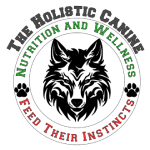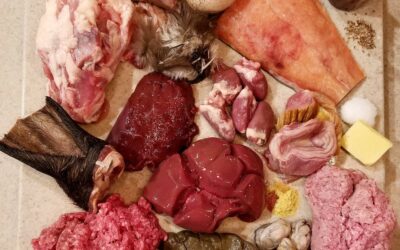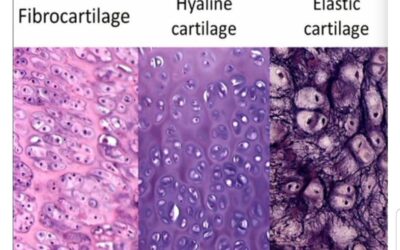Long lasting health begins in your dog’s gut!
If our goal is to cultivate optimal health in our dogs, than every pet parent’s focus must be turned to their dog’s microbiome. Just like us, our dogs contain a vast and complex array of microorganisms that in-and-of-themselves make up its own distinct system. The amount of genetic information contained within the microbiome is immense. But what is most incredible is the commensal relationship that your dog shares with his/her microorganisms. The microbiome is teeming with bacteria, viruses, and fungi that are essential for the correct and peak functioning of digestion, immunity, and brain function.
Intriguingly, “germs” generate fear which is blaringly obvious by the frantic quest for immunity against the perceived deadly strains of microbes. Doctors and veterinarians warn against the dangers of pathogenic microbes and push antibiotics and vaccines. Additionally, warnings against the dangers of feeding raw meats and organs to dogs and cats is filling the internet. But recent understanding of the microbiome is only now beginning to show that those “germs” are required for immunological homeostasis [1]. The microbiome is the very defense mechanism that not only protects against deadly pathogenic organisms, but drives immunity and health cultivation. In fact, seventy percent (70%) of your dog’s immune cells reside in the gut alongside the microbiome. Incredibly, a unique communicatory partnership exists between the gut (immune cells and microflora) and the brain [2]. The microbiome is your dog’s dominant military defense against the proliferation of pathogenic organisms as well as the foundation of immune response, nutrient absorption, mental poise, hormone balance, and the forces behind the cultivation of optimal health and healing.
As a result of this exciting science, the popularity among probiotic and prebiotic supplements has increased and will continue its wave of popularity as a greater understanding of the microbiome continues to come to light. But are these supplements really all that beneficial and worth the expense? In short, no. Continually feeding your dog a probiotic supplement is a fruitless endeavor and waste of money [3]. If your dog is recovering from a gut issue, a week or two on probiotics can be quite helpful, but that is its limitation. Realize that you are introducing hundreds of thousands of a mere three, maybe ten, species of bacteria to your dog’s microbiome that should contain upwards of 30,000 species of microorganisms. Attempting to cultivate a microbiome with a mere three to ten species creates imbalance. Your dog’s gut should look like a tropical rainforest alive and flourishing with tens of thousands of biological species, not a desert or mere field with a few species of plants and insects. Do you see the difference? This very difference is what makes one dog healthier and stronger than another. Forget the probiotic supplements and focus on cultivating the microbiome the way nature intended.
Every dog, like every human being, is born with their unique and active microbiome which begins within the womb and is further enhanced during whelping via the birth canal of his or her dam. Dam’s milk begins the nourishment of the body, the immune system, the brain, and the internal microflora. How soon pups are weaned, what food they are weaned onto, and what chemicals are introduced into their tiny bodies can either support or damage their vital, dynamic, and maturing microbiome. This can set them up for a life of health and vitality or a life of health crises and a decreased life expectancy.
We must all understand this important detail: the health and longevity of the modern canine begins with the breeders. Responsible breeders will never breed dogs with genetic abnormalities or from breeding lines with high mortality rates. Nor will they breed without the appropriate veterinary and DNA testing to certify health. An additional step that is critical to future offspring is to prepare breeding dams (and sires) before any litter is even considered for the sake of both mama and pups. Providing potential dams with a species-appropriate raw food diet and cultivating optimal health through holistic health care strategies are necessary to nurture and strengthen her microbiome for the benefit of both her and the offspring. Searching for a naturally-rearing breeder is highly recommended if your desire is to grow a healthy dog with a greater chance of resilience to illness and disease, especially if longevity is your ultimate goal.
What about those dogs who were not the product of a carefully selected breeding program? The focus of pet parents who are the guardians of these precious canines must be on the proliferation of an active and vigorously health-cultivating microbiome if health and longevity is on their radar. This is essential! Knowing where and how to nourish the microbiome is priority, especially in puppies. This begins with providing a species-appropriate diet that is raw and teeming with not only macro and micronutrients, enzymes, coenzymes, factors, cofactors, and numerous other vital constituents, but also microorganisms. Your dog NEEDS to receive microorganisms from the outside in order to build and strengthen his/her microflora colony.
The microbiome is alive, dynamic, and in communication with your dog’s brain. A weak and imbalanced microbiome can contribute to numerous health and mental concerns. Dysbiosis, the term for an imbalanced microbiome, is a serious and growing concern that decreases nutrient absorption and leaves your dog vulnerable to potentially pathogenic bacteria and viruses that a healthy microbiome should easily accommodate. If pathogenic bacteria, viruses, and fungi are cultivated within the gut, your dog will be nearly defenseless against so-called “germs” with the added bonus of mental instability. Dysbiosis leads to acute illness, immune disorders, sensitivities and allergies, gut inflammation, colitis, Irritable Bowel Syndrome, Inflammatory Bowel Disease, anxiety, hyperactivity, aggression, depression, and a whole host of other potential health and mental crises. Dogs with dysbiosis are in dire need of correcting, establishing, and proliferating their microbiome with beneficial microorganisms. How is this done?
To cultivate a strong and healthy microbiome flourishing with as many as 30,000 species of bacteria, viruses, and fungi, implement the following strategies:
- Offer a varied and balanced species-appropriate raw diet.
- Get your dog out into the fresh air, especially where nature is abundant. Exercise them and stir up the grasses, soil, and trees. Microorganisms enter your dog’s body through their noses and via their fur and skin.
- Soil is abundant in microflora and dogs love to dig and stick their noses into their dirt holes. Give your dog an opportunity to be in the soil. Soil enriches the microbiome. Allowing your dog to eat his food outside on the lawn is also a great way to introduce microorganisms.
- The environment offers a wealth of microflora. Take your dog on hikes to different areas to allow for the greatest possible exposure to microorganisms. Many holistically minded breeders and pet parents that prefer to avoid vaccines do this to expose their dogs to pathogens for the main purpose of creating true and lasting immunity. While pathogens are not the main goal of increasing the species load and strengthening of the immune system, they are required, as stated above, to establish immunological homeostasis.
- Offer raw and/or soured raw milk as this contains a wealth of beneficial bacteria. Also, consider offering foods that have been subjected to “wild fermentation [3].” If you want to feed your dog fermented foods, make sure you are either fermenting foods at home using the wild method or do not offer at all. Most fermented foods are not species-appropriate and may cause intestinal upset. Yogurt is not recommended as most products contain carrageenan and other thickening agents. Stick with kefir or cottage cheese that has nothing added.
- Water can also contain microflora. Although offering your dog purified or filtered water is advisable for regular in-home drinking water, dogs also love to drink out of mud holes, streams, ponds, and even toilets. This is not my recommended source for regular exposure, but it is immensely effective. While it is possible that a few dogs with weakened immunity may pick up a pathogen, most dogs will suffer no-ill effect.
Never has science been so exciting! We are discovering that life is a symbiotic dance among biological entities, a partnership that assists and serves for the ultimate goal of optimal health and vitality.
©2019 Kimberly Lloyd, PhD, BCHHP, Cert Raw Dog Food Nutritionist
[1] The mammalian virome in genetic analysis of health and disease pathogenesis, https://www.youtube.com/watch?v=TRVxTBuvChU
[2] The brain-gut-microbiome axis, http://www.greenmedinfo.com/article/brain-gut-microbiome-axis
[3] Dr. Zach Bush, MD, triple board certified physician and leading expert on the microbiome; https://zachbushmd.com/wp-content/uploads/2017/04/Why-Probiotics-Dont-Always-Work-EG-BB-edit.pdf



